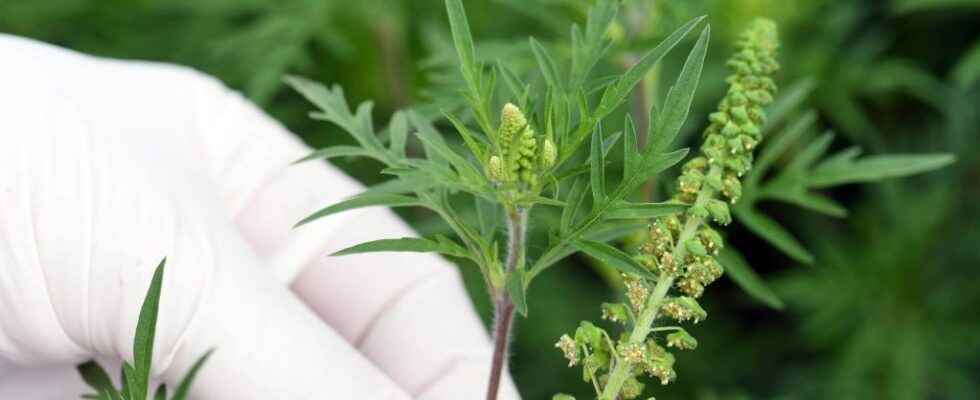Among the pollens that cause allergies, that of ragweed is a real scourge. It is indeed responsible for major allergies, sometimes severe, when it sheds its pollen at the end of summer and in autumn. The first grains of pollen are already there.
Most allergenic plant known to this day, ragweed is very present in Auvergne-Rhône-Alpes and Burgundy where it is wreaking havoc. In the Lyon region, ragweed pollen concentrations can thus exceed 750 grains / m3 / day in the most infested areas, while it is estimated that allergic reactions can appear from 10 grains / m3.
Ragweed allergy: what are the symptoms?
Runny nose, bursts of sneezing, itching on the nose and palate, feeling of sand in the eye, photophobia, sometimes edema on the eyelids are the symptoms that are found in 90% of allergy sufferers to ragweed . “These are the same symptoms as other pollens but with greater severity” explains Dr Martine Grosclaude, an allergist doctor.
Ambrosia also causes asthma in one in two allergic people, “which is more frequent than for other pollens” underlines the allergist. In some, it will take the form of one or two attacks per year. But it can go as far as severe asthma, and sometimes even resuscitation.
Finally, ambrosia can cause skin damage in 10% of cases.
“There is no age for allergy, and particularly for ragweed. It can appear during menopause. Sometimes even later.”
Allergy to ragweed: how is it treated?
The first treatments consist in controlling the inflammation with local corticosteroids, antihistamines, eye drops. “The nose must also be treated to decongest it because the risk of asthmatic slippage is high” explains Dr Grosclaude.
Desensitization is reserved for people whose allergy has been proven using an allergological assessment. It does not make the allergy go away, but it does induce a new tolerance towards the allergen. “It is the only treatment capable of modifying the natural history of ragweed allergy. We have 70 to 75% good results with rhinitis that will not develop into asthma. And 20% failures” emphasizes the doctor.
Ambrosia is gaining ground
Introduced in Europe at the end of the 19th century, theAmbrosia artemisiifolia can grow up to 2 meters tall and produce a number of small flowers that diffuse pollen with strong allergenic power. Its pollens frequently cling to animal hair and clothing, thus promoting dissemination.
Every summer, from June 15 to 30, the Days for the fight against ambrosia take place. During these 15 days, activities are organized to alert people to allergies generated by ambrosia. And grubbing campaigns are organized before flowering at the end of July.
But the eradication of ambrosia is very difficult because the plant gradually spreads along the railway tracks, along the roads, in agricultural plots (and in particular in the corn fields), in the construction sites of construction. In addition, the lifespan in the soil of ragweed seeds is several years, it is therefore necessary to renew the uprooting several years in a row to be sure to get rid of the plant.
Concentration multiplied by 4 by 2050
Under the effect of rising temperatures, the plant will gradually invade other regions. “Climate change will have an impact on the expansion of ragweed,” Nicolas Viovy, researcher at the Climate and Environmental Sciences Laboratory, told Top santé (in the March magazine).
According to the prospective studies of this laboratory, by 2050 the concentration of ragweed pollen will be quadrupled, due to the warming of temperatures and the increase in the level of CO2 in the atmosphere, but also to the development of the plant itself which is proliferating. “The increase in temperature favors its progression towards the North. So much so that today we find ambrosia bushes at the foot of Notre-Dame, on unmaintained grounds” underlines Dr Martine Grosclaude.
Read also :
Subscribe to the Top Santé Newsletter to receive the latest news for free
